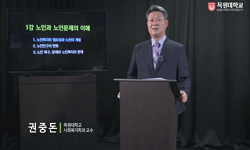The purpose of this study is to find out the factor that affects the satisfaction of the elderly welfare center user and to improve the operation of the elderly welfare center and to find the theoretical and practical way to operate the elderly welfar...
http://chineseinput.net/에서 pinyin(병음)방식으로 중국어를 변환할 수 있습니다.
변환된 중국어를 복사하여 사용하시면 됩니다.
- 中文 을 입력하시려면 zhongwen을 입력하시고 space를누르시면됩니다.
- 北京 을 입력하시려면 beijing을 입력하시고 space를 누르시면 됩니다.
https://www.riss.kr/link?id=T15374360
- 저자
-
발행사항
서울 : 중앙대학교 행정대학원, 2019
-
학위논문사항
학위논문(석사) -- 중앙대학교 행정대학원 , 복지행정학과 사회복지전공 , 2019. 8
-
발행연도
2019
-
작성언어
한국어
- 주제어
-
발행국(도시)
서울
-
기타서명
(A) study on influencing factors for satisfaction of senior welfare center users : focused on Seoul, Busan and Gyeonggi province
-
형태사항
vi, 106 p. : 삽화, 도표 ; 26 cm
-
일반주기명
중앙대학교 논문은 저작권에 의해 보호받습니다.
지도교수: 조성한
참고문헌수록 -
UCI식별코드
I804:11052-000000230338
- DOI식별코드
- 소장기관
-
0
상세조회 -
0
다운로드
부가정보
다국어 초록 (Multilingual Abstract)
In order to analyze the correlation between the independent variables and the dependent variables, we use simple statistical analysis to analyze the demographic characteristics of the elderly welfare center users And multiple regression analysis, linear regression analysis, independent sample T test, and ANOVA were used to test six research hypotheses. First, the level of management and operation, the level of facilities and environment, the quality level of programs, and the relationship between employees and users had significant effects on the satisfaction of the elderly welfare center users. Second, in the demographic characteristics of the elderly using the elderly welfare centers in Seoul, Busan, and Gyeonggi province, the Gender utilization rates affected the user's satisfaction level of female than male. Third, there was statistically significant relation with spouse status, education level and subjective economic status, but it did not affect the satisfaction of the elderly welfare center. Fourth, there was no statistically significant difference between the age-specific use and the regional use, which had no effect on the satisfaction of the elderly welfare center users.
Based on this study, implications and suggestions based on this study are as follows. First, structuring management techniques appropriate to the elderly welfare service characteristics of the elderly welfare center should respond to the needs of diverse and rapidly changing users of the elderly and satisfy customer needs centered on customer satisfaction management. Second, in order to further improve the satisfaction of the elderly welfare center users, it is necessary to simultaneously invest hardware for physical resources, raise expertise of human resources, and invest in software to improve the relationship between employees and users. Third, in order to improve the satisfaction of users who use the elderly welfare center, the existence value of the elderly welfare center is determined by improving the quality of the hobby and leisure program, Considering the fact that it is influenced by the needs of the elderly, excellent quality and various excellent programs considering the needs of the elderly should be developed and distributed.
In order to do this, the government should propose a policy direction to the national and local governments, the National government should enlarge the finances of the elderly welfare centers, and the local governments should promote the welfare of the elderly based on the principle of self-decision. It is necessary to develop not only good quality programs that guarantee the program contents of elderly welfare services but also various projects. Through this, the elderly will pursue a happy old age in their current residence through a healthy and stable life, become affectionate with life as a passion of life, Therefore, the elderly will put their competence and passion into local communities, mutual support and intergenerational cooperation among the generations, and coexist as a very social member in the local community.
The purpose of this study is to find out the factor that affects the satisfaction of the elderly welfare center user and to improve the operation of the elderly welfare center and to find the theoretical and practical way to operate the elderly welfare center focused on the consumer. The quality level of the program, and the relationship between the employee and the user affects the satisfaction of the elderly welfare center users, as well as the management level of the elderly welfare center. For this purpose, 410 elderly people aged 60 or older who are using the elderly welfare center in Seoul, Busan, and Gyeonggi Province were surveyed by Simple Random Sampling.
In order to analyze the correlation between the independent variables and the dependent variables, we use simple statistical analysis to analyze the demographic characteristics of the elderly welfare center users And multiple regression analysis, linear regression analysis, independent sample T test, and ANOVA were used to test six research hypotheses. First, the level of management and operation, the level of facilities and environment, the quality level of programs, and the relationship between employees and users had significant effects on the satisfaction of the elderly welfare center users. Second, in the demographic characteristics of the elderly using the elderly welfare centers in Seoul, Busan, and Gyeonggi province, the Gender utilization rates affected the user's satisfaction level of female than male. Third, there was statistically significant relation with spouse status, education level and subjective economic status, but it did not affect the satisfaction of the elderly welfare center. Fourth, there was no statistically significant difference between the age-specific use and the regional use, which had no effect on the satisfaction of the elderly welfare center users.
Based on this study, implications and suggestions based on this study are as follows. First, structuring management techniques appropriate to the elderly welfare service characteristics of the elderly welfare center should respond to the needs of diverse and rapidly changing users of the elderly and satisfy customer needs centered on customer satisfaction management. Second, in order to further improve the satisfaction of the elderly welfare center users, it is necessary to simultaneously invest hardware for physical resources, raise expertise of human resources, and invest in software to improve the relationship between employees and users. Third, in order to improve the satisfaction of users who use the elderly welfare center, the existence value of the elderly welfare center is determined by improving the quality of the hobby and leisure program, Considering the fact that it is influenced by the needs of the elderly, excellent quality and various excellent programs considering the needs of the elderly should be developed and distributed.
In order to do this, the government should propose a policy direction to the national and local governments, the National government should enlarge the finances of the elderly welfare centers, and the local governments should promote the welfare of the elderly based on the principle of self-decision. It is necessary to develop not only good quality programs that guarantee the program contents of elderly welfare services but also various projects. Through this, the elderly will pursue a happy old age in their current residence through a healthy and stable life, become affectionate with life as a passion of life, Therefore, the elderly will put their competence and passion into local communities, mutual support and intergenerational cooperation among the generations, and coexist as a very social member in the local community.
국문 초록 (Abstract)
본 연구 분석을 정리하면, 연구 대상자인 노인복지관 이용자의 인구사회학적 특성과 이용 관련한 특성을 파악하기 위해 기술통계기법을 사용하였고, 독립변수와 종속변수 사이의 상관관계를 분석하기 위해 단순상관관계분석을 사용했으며, 6개의 연구가설의 검증을 위해서 다중회귀분석, 선형회귀분석, 독립표본 T 검정, 분산분석(ANOVA)을 사용하였다. 첫째, 독립변수인 관리 운영 수준을 비롯하여 시설 및 환경 수준, 프로그램의 품질 수준, 그리고 직원과 이용자의 관계가 노인복지관 이용자의 만족도에 유의미한 영향을 미쳤다. 둘째, 서울, 부산, 경기 지역의 노인복지관을 이용하는 노인의 인구사회학적 특성에서 성별 이용률은 여성 노인이 남성 노인보다 이용자 만족도에 영향을 미쳤다. 셋째, 배우자 유무와 교육 수준과 주관적 경제 상태와 관련해서는 통계적으로는 유의했으나, 노인복지관 이용자의 만족도에는 크게 영향을 미치지는 않았다. 넷째, 연령별 이용과 지역별 이용은 통계적으로 유의하지 않음으로써 노인복지관 이용자의 만족도에 아무런 영향을 미치지 않았다.
본 연구를 바탕으로 함의와 제언은 첫째, 노인복지관의 노인복지서비스 특성에 적절한 경영기법을 구조화하여 노인의 다양하고 급변하는 이용자의 욕구에 발 빠르게 대응한 수요자 중심의 고객 만족 경영이 이뤄져야 한다. 둘째, 노인복지관 이용자의 만족도를 지금보다 더욱더 향상하기 위해서는 물적 자원의 하드웨어 투자와 인적 자원의 전문성 제고, 직원과 이용자 사이의 관계성 향상을 위한 소프트웨어 투자가 동시에 이뤄져야 한다. 셋째, 노인복지관을 이용하는 이용자 만족도를 향상하려면, 무엇보다도 제공되는 취미·여가프로그램의 품질뿐만 아니라 건강증진 프로그램의 확대, 식사 서비스 이용 등 친목을 도모함으로써 그 존재적 가치가 노인복지관의 성패를 좌우한다는 점을 고려하여 노인의 욕구를 고려한 훌륭한 품질과 다양하고 뛰어난 프로그램이 개발되고 보급되어야 한다.
이를 위해서 국가와 지방정부에 정책 방향을 제언하면, 국가는 노인복지관의 재정을 대폭으로 확충해 나가야 하고, 지방정부는 자기 결정과 자기 책임의 원칙을 근거로 노인의 복리에 증진해 나가야 하며, 형식적인 노인복지서비스의 프로그램 내용을 담보해내는 양질의 프로그램뿐만 아니라 다양한 사업을 전개해나가야 한다. 그럼으로써 노인은 건강하고 안정된 삶을 통해서 현재 거주하는 곳에서 행복한 노년을 추구하며, 노년 생활을 당당하게 자신의 삶에 직면하고, 긍정하는 태도로 살아온 삶의 열정만큼 애정을 가지고 여생의 버팀목이 될 수 있다. 따라서 노인은 자신이 가진 역량과 열정을 지역 공동체에 투입하고, 세대 사이의 상호부조와 상호연대를 도모하며, 지역 공동체 속에서 아주 당당한 사회구성원으로 공존할 것이다.
본 연구는 노인복지관 이용자의 만족도에 영향을 미치는 경로를 파악하여 노인복지관 운영의 내실화를 꾀하고, 수요자 중심의 노인복지관 운영을 위한 이론적이고 실천적인 방안을 모색하...
본 연구는 노인복지관 이용자의 만족도에 영향을 미치는 경로를 파악하여 노인복지관 운영의 내실화를 꾀하고, 수요자 중심의 노인복지관 운영을 위한 이론적이고 실천적인 방안을 모색하고 토대를 마련하는 데 목적을 두고 있다. 이용 기간, 이용자 사이의 관계성 그리고 노인복지관의 관리 운영 수준을 비롯하여 시설 및 환경 수준, 프로그램의 품질 수준 그리고 직원과 이용자의 관계가 노인복지관 이용자의 만족도에 어떤 영향을 미치는지를 구체적으로 확인하였다. 이를 위해 서울, 부산, 경기 지역의 소재 노인복지관을 이용하고 있는 만 60세 이상의 노인 410명을 대상으로 단순무직위표집(Simple Random Sampling)으로 설문을 하여 이를 최종 분석 자료로 사용하였다.
본 연구 분석을 정리하면, 연구 대상자인 노인복지관 이용자의 인구사회학적 특성과 이용 관련한 특성을 파악하기 위해 기술통계기법을 사용하였고, 독립변수와 종속변수 사이의 상관관계를 분석하기 위해 단순상관관계분석을 사용했으며, 6개의 연구가설의 검증을 위해서 다중회귀분석, 선형회귀분석, 독립표본 T 검정, 분산분석(ANOVA)을 사용하였다. 첫째, 독립변수인 관리 운영 수준을 비롯하여 시설 및 환경 수준, 프로그램의 품질 수준, 그리고 직원과 이용자의 관계가 노인복지관 이용자의 만족도에 유의미한 영향을 미쳤다. 둘째, 서울, 부산, 경기 지역의 노인복지관을 이용하는 노인의 인구사회학적 특성에서 성별 이용률은 여성 노인이 남성 노인보다 이용자 만족도에 영향을 미쳤다. 셋째, 배우자 유무와 교육 수준과 주관적 경제 상태와 관련해서는 통계적으로는 유의했으나, 노인복지관 이용자의 만족도에는 크게 영향을 미치지는 않았다. 넷째, 연령별 이용과 지역별 이용은 통계적으로 유의하지 않음으로써 노인복지관 이용자의 만족도에 아무런 영향을 미치지 않았다.
본 연구를 바탕으로 함의와 제언은 첫째, 노인복지관의 노인복지서비스 특성에 적절한 경영기법을 구조화하여 노인의 다양하고 급변하는 이용자의 욕구에 발 빠르게 대응한 수요자 중심의 고객 만족 경영이 이뤄져야 한다. 둘째, 노인복지관 이용자의 만족도를 지금보다 더욱더 향상하기 위해서는 물적 자원의 하드웨어 투자와 인적 자원의 전문성 제고, 직원과 이용자 사이의 관계성 향상을 위한 소프트웨어 투자가 동시에 이뤄져야 한다. 셋째, 노인복지관을 이용하는 이용자 만족도를 향상하려면, 무엇보다도 제공되는 취미·여가프로그램의 품질뿐만 아니라 건강증진 프로그램의 확대, 식사 서비스 이용 등 친목을 도모함으로써 그 존재적 가치가 노인복지관의 성패를 좌우한다는 점을 고려하여 노인의 욕구를 고려한 훌륭한 품질과 다양하고 뛰어난 프로그램이 개발되고 보급되어야 한다.
이를 위해서 국가와 지방정부에 정책 방향을 제언하면, 국가는 노인복지관의 재정을 대폭으로 확충해 나가야 하고, 지방정부는 자기 결정과 자기 책임의 원칙을 근거로 노인의 복리에 증진해 나가야 하며, 형식적인 노인복지서비스의 프로그램 내용을 담보해내는 양질의 프로그램뿐만 아니라 다양한 사업을 전개해나가야 한다. 그럼으로써 노인은 건강하고 안정된 삶을 통해서 현재 거주하는 곳에서 행복한 노년을 추구하며, 노년 생활을 당당하게 자신의 삶에 직면하고, 긍정하는 태도로 살아온 삶의 열정만큼 애정을 가지고 여생의 버팀목이 될 수 있다. 따라서 노인은 자신이 가진 역량과 열정을 지역 공동체에 투입하고, 세대 사이의 상호부조와 상호연대를 도모하며, 지역 공동체 속에서 아주 당당한 사회구성원으로 공존할 것이다.
목차 (Table of Contents)
- 제1장 서론 1
- 제1절 연구의 배경과 목적 1
- 제2절 연구 문제 7
- 제2장 이론적 배경 및 선행연구 고찰 8
- 제1절 노인복지관의 개념과 필요성 8
- 제1장 서론 1
- 제1절 연구의 배경과 목적 1
- 제2절 연구 문제 7
- 제2장 이론적 배경 및 선행연구 고찰 8
- 제1절 노인복지관의 개념과 필요성 8
- 1. 노인복지관의 개념 8
- 2. 노인복지관의 필요성 10
- 제2절 노인복지관의 주요한 사업 내용 12
- 제3절 노인복지관의 운영 현황과 실태 18
- 제4절 이용자 만족도의 개념과 측정 23
- 제5절 이용자 만족도 관련 주요한 선행이론 26
- 제6절 이용자 만족도에 영향을 미치는 요인 32
- 1. 노인복지관 이용과 관련한 요인의 이용자 만족도 33
- 2. 노인복지관 관리운영과 시설환경 수준의 이용자 만족도 36
- 3. 노인복지관 프로그램 품질의 이용자 만족도 38
- 4. 노인복지관 직원과 이용자 관계의 이용자 만족도 39
- 5. 사회관계망에 따른 이용자 만족도 40
- 제3장 연구 방법 및 범위의 설계 43
- 제1절 연구 가설 및 연구 분석 틀 43
- 1. 연구 가설 43
- 2. 연구 분석 틀(연구 모형) 43
- 제2절 연구 측정 도구 45
- 1. 종속변수 45
- 2. 독립변수 46
- 3. 인구사회학적 특성 48
- 제3절 연구 대상 및 표집 49
- 제4절 연구 자료 분석 방법 52
- 제4장 연구 결과 53
- 제1절 노인복지관 연구대상자의 일반적 특성 53
- 1. 노인복지관 연구대상자의 인구 사회학적 특성 53
- 2. 노인복지관 연구대상자의 주요한 이용 관련 특성 57
- 3. 노인복지관 연구대상자의 이용자 만족도 분석 59
- 제2절 노인복지관 이용자의 만족도 영향 요인 68
- 1. 노인복지관 이용자의 만족도 요인 평균과 표준편차 68
- 2. 노인복지관 개별 요인의 평균과 표준편차 69
- 제3절 상호 변수 간의 분석 결과 71
- 1. 종속변수와 독립변수 간의 다중회귀분석 71
- 2. 종속변수와 독립변수 간의 분산분석 72
- 3. 계수로 통해 본 다중공선성의 통계 73
- 4. 인구사회학적 특성에 따른 변인 분석 74
- 제5장 결론과 제언 82
- 제1절 연구 결과와 논의 82
- 제2절 연구 함의와 제언 85
- 제3절 연구 한계와 방향 88
- 참고문헌 89
- 부록(설문지) 96
- 국문초록 102
- Abstract 104












